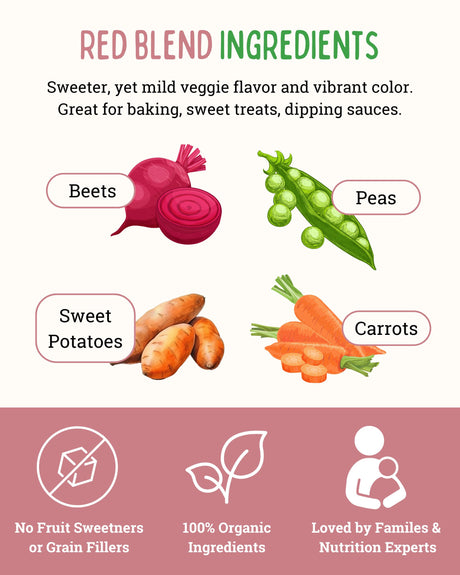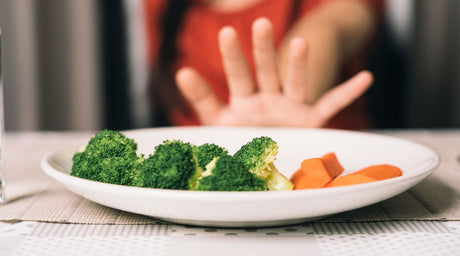Promoting Healthy Eating Habits
Healthy eating habits start early, and what better way to instill them than by involving children in the process of growing their own food? By gardening, kids can develop a greater appreciation for fruits and vegetables and are more likely to incorporate them into their diets.
This hands-on experience not only teaches them about nutrition but also empowers them to make healthier food choices.
Gardening offers a myriad of benefits beyond just providing fresh produce. It encourages physical activity, teaches valuable life skills, and promotes mental well-being. Throughout this blog, we'll explore how gardening can positively impact children's nutrition and overall health, making it a valuable activity for families to engage in together.
So, let's dig in and discover the many ways gardening can benefit our little ones' growing bodies and minds.
Connecting Kids with Nature
In today's digital age, children are spending more time indoors than ever before, leading to a concerning disconnect between them and the natural world. With the allure of screens and technology, many kids are missing out on the benefits of outdoor play and exploration.
This detachment from nature can have adverse effects on their physical and mental well-being.
Importance of Reconnecting
It's essential to prioritize reconnecting children with nature to foster their development and overall health. Research shows that spending time outdoors can improve mood, reduce stress, and enhance cognitive function in children. By immersing themselves in nature, kids can develop a deeper appreciation for the world around them and cultivate a sense of stewardship for the environment.
Gardening as a Solution
Gardening provides a hands-on way for children to engage with nature and reap its benefits. Tending to plants, digging in the soil, and watching seeds grow into vegetables or flowers offer valuable lessons about the cycle of life and the interconnectedness of living organisms.
Through gardening, children can develop a sense of responsibility, patience, and respect for the natural world.
Nutritional Benefits of Gardening
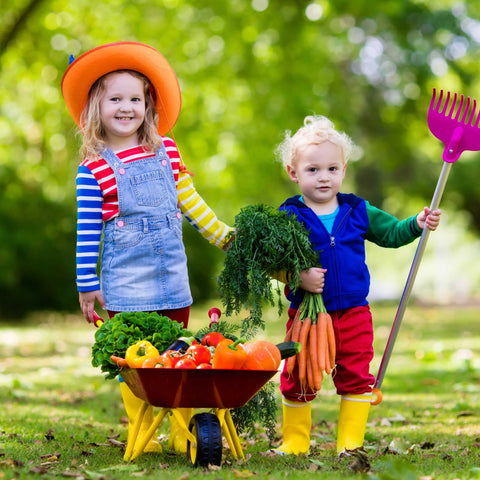
Gardening offers a plethora of nutritional benefits, especially when it comes to homegrown fruits and vegetables. Unlike store-bought produce, which may lose some nutrients during transportation and storage, fruits and vegetables harvested from the garden are fresh and packed with essential vitamins, minerals, and antioxidants.
Promoting a Diverse Diet
One of the significant advantages of gardening for children's nutrition is its role in promoting a diverse and balanced diet. When kids participate in growing their fruits and vegetables, they are more likely to try new foods and develop a preference for fresh, whole foods over processed alternatives. This exposure to a variety of fruits and vegetables can help expand their palate and contribute to a more nutrient-rich diet.
Seed to Table Concept
The "seed to table" concept emphasizes the journey of food from planting seeds in the garden to serving them on the dinner table. By actively participating in each step of this process, children gain a deeper understanding of where their food comes from and how it nourishes their bodies. This hands-on experience fosters a sense of connection to the food they eat and encourages them to make healthier food choices.
Educational Opportunities in Gardening
Gardening provides a wealth of educational opportunities for children, offering firsthand experiences in plant life cycles and food origins. As kids plant seeds, nurture seedlings, and watch plants grow, they learn about the natural processes of germination, photosynthesis, and pollination. These hands-on activities engage children in scientific exploration and deepen their understanding of the interconnectedness of living organisms.
Understanding Food Origins
By participating in gardening, children gain insight into where their food comes from and how it's grown. They witness the transformation of seeds into plants and observe the journey of fruits and vegetables from the garden to the table. This firsthand experience helps demystify the food production process and instills a greater appreciation for the effort and resources involved in growing food.
Importance of Hands-On Learning
Hands-on learning experiences are essential for children's nutrition education, as they provide tangible connections to abstract concepts. Gardening offers a multisensory approach to learning, allowing children to see, touch, smell, and taste the fruits of their labor.
By actively engaging in the gardening process, children develop a deeper connection to the food they eat and are more likely to make healthy choices for their bodies.
Positive Influence of Gardening on Eating Habits
Involvement in gardening can have a profound impact on children's attitudes towards fruits and vegetables. When kids actively participate in growing and harvesting produce, they develop a sense of pride and ownership over their food. This hands-on experience fosters a positive relationship with fruits and vegetables, making them more likely to be embraced as part of a healthy diet.
Gardening has been linked to increased consumption of vegetables among children, as they are more likely to eat a wider variety and consume nutrient-rich foods, enhancing their appreciation for fresh produce.
Tips for Using Homegrown Produce in Meals
Using homegrown produce in family meals is a rewarding way to encourage healthy eating habits. Parents can involve children in meal preparation, allowing them to select and prepare fruits and vegetables harvested from the garden.
Incorporating homegrown produce into familiar dishes, such as salads, stir-fries, and smoothies, can make healthy eating more appealing to children. Additionally, involving children in cooking and meal planning empowers them to make nutritious food choices and cultivates lifelong habits of healthful eating.
Physical Activity in Gardening
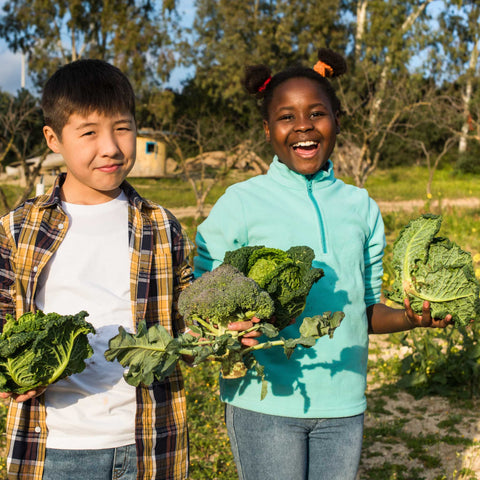
Gardening involves a variety of physical activities that contribute to children's overall health and well-being. From digging and planting to watering and weeding, gardening provides kids with opportunities for moderate physical activity that help promote cardiovascular fitness, muscle strength, and coordination. Engaging in these activities regularly can support children's physical development and lay the foundation for a healthy lifestyle.
Mental Health Benefits of Outdoor Time
Spending time outdoors and engaging in gardening activities can have significant positive effects on children's mental well-being. Research has shown that exposure to nature and green spaces is associated with reduced stress, anxiety, and depression in children.
Gardening offers a unique opportunity for children to connect with nature, which can promote feelings of calmness, relaxation, and overall mental wellness.
Therapeutic Aspects of Gardening
Gardening offers therapeutic benefits for children, providing physical activity and mental well-being. Children can experience joy, fulfillment, and accomplishment while nurturing living things. Repetitive tasks like watering and pruning reduce stress and improve mood.
Overall, gardening promotes holistic health and happiness in children, offering a holistic approach to physical activity.
Practical Skills Development
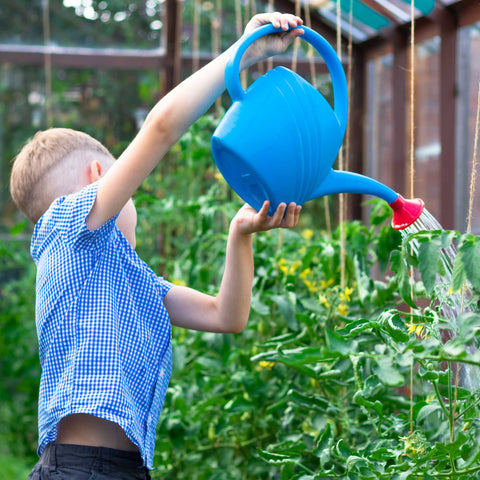
Gardening offers children opportunities to develop a range of practical skills that are valuable both in and out of the garden. Through tasks such as planting seeds, watering plants, and harvesting produce, children learn important skills such as responsibility, patience, and teamwork. Taking care of plants requires consistency and attention to detail, helping children understand the importance of following through on commitments and being accountable for their actions.
Promoting Confidence and Self-Esteem
Engaging in gardening activities can also boost children's confidence and self-esteem. As they witness the growth and progress of their plants, children gain a sense of accomplishment and pride in their abilities. Successfully nurturing plants from seedlings to maturity reinforces their belief in their capabilities and encourages them to take on new challenges with confidence. Additionally, receiving praise and recognition for their gardening efforts from family members and peers further bolsters their self-esteem.
Transferable Skills for Future Success
Gardening equips children with transferable skills, enhancing patience, perseverance, and cooperativeness. These skills can be applied to various aspects of their lives, including school, extracurricular activities, and future careers, contributing to their personal growth and success.
Common Challenges in Children's Gardening
Gardening with children can present several challenges, from limited space to a lack of gardening experience. Many families may feel overwhelmed by the prospect of starting a garden, especially if they live in urban areas or have little gardening knowledge. Additionally, unpredictable weather conditions and pests can pose obstacles to successful gardening efforts.
Practical Solutions and Tips
Practical solutions for gardening with children include container gardening, vertical gardening techniques, and incorporating easy-to-grow plants like salad greens. Engaging children in the planning process and allowing them to choose plants can help overcome challenges.
Persistence and Adaptability
Above all, it's essential to encourage persistence and adaptability when faced with challenges in children's gardening. Gardening is a learning process, and setbacks are inevitable. Use challenges as opportunities for growth and learning, teaching children valuable lessons about resilience and problem-solving.
By embracing a positive attitude and remaining flexible in the face of obstacles, families can turn challenges into valuable learning experiences and ultimately enjoy the rewards of a successful garden.
Selecting Child-Friendly Plants
When starting a garden with kids, it's essential to choose plants that are easy to grow and maintain, as well as appealing to children. Opt for fast-growing vegetables like cherry tomatoes, snap peas, and radishes, which offer quick gratification and are perfect for little hands to harvest. Brightly colored flowers such as sunflowers, marigolds, and zinnias add visual appeal to the garden and attract pollinators like butterflies and bees, creating a vibrant and educational environment for children.
Creating a Child-Friendly Garden Space
Creating a child-friendly garden space involves considering safety, accessibility, and sensory appeal. Designate a specific area of the garden that is easily accessible to children and free from potential hazards like sharp tools or toxic plants. Incorporate elements that engage children's senses, such as fragrant herbs, textured foliage, and colorful flowers.
Install raised beds or garden boxes at a height that is comfortable for children to reach, allowing them to participate in planting, watering, and harvesting with ease.
Involving Children in the Gardening Process
Involving children in the gardening process fosters ownership, excitement, and curiosity. Assign age-appropriate tasks, like planting seeds and watering plants, and celebrate successes. This encourages exploration and interaction with the natural processes, creating lasting memories and fostering a lifelong love for nature.
Summary
Gardening offers a multitude of benefits for children's nutrition and overall well-being. From providing access to fresh, homegrown fruits and vegetables to fostering a deeper connection with nature, gardening serves as a valuable tool for promoting healthy habits and positive lifestyle choices. By involving children in the gardening process, families can encourage healthy eating, physical activity, and mental well-being while also teaching valuable life skills and fostering a sense of responsibility and stewardship for the environment.
Encouragement for Families
As families embark on their gardening journey, it's essential to approach the experience with enthusiasm, curiosity, and a willingness to learn together. Embrace the opportunity to bond as a family while nurturing plants, observing nature's wonders, and reaping the rewards of your hard work. Remember that gardening is a journey, not a destination, and setbacks and challenges are inevitable.
Stay patient, flexible, and resilient, and celebrate the small victories along the way. By embracing gardening as a fun and educational activity, families can cultivate a love for nature, healthy eating, and lifelong wellness in children that will serve them well into the future.
Leave your comments below; we love to hear from you! And don't forget to follow EasyPeasie for more veggie info and convo on YouTube, Facebook, and Instagram! ~ThePeas









